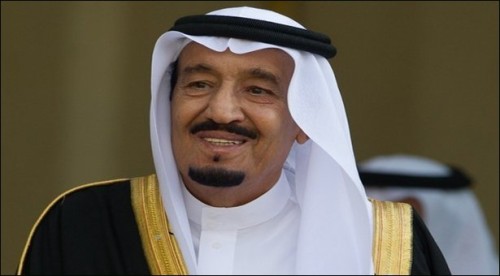PHOTO: Saudi Arabia’s King Salman
Colum Lynch writes for Foreign Policy:
Saudi Arabia and its Gulf allies are carrying out a vigorous diplomatic campaign to prevent international scrutiny of its conduct during a six-month air war against Yemen’s Houthi rebels, according to diplomatic sources and confidential documents obtained by Foreign Policy.
The Saudi-led coalition has increased the number of airstrikes in Houthi strongholds in recent weeks, stirring concerns by U.N. officials and diplomats that the fighting is entering an even deadlier new phase. The conflict — which has already resulted in the deaths of more than 2,000 civilians and the injury of nearly 5,000 more — has been marked by flagrant human rights abuses on both sides.
But the vast majority of civilian deaths and injuries are the result of airstrikes by the U.S.-backed Gulf coalition, according to UN figures.
Saudi Arabia and its Sunni allies intervened in Yemen last March to restore power to Yemen’s deposed leader, President Abdrabuh Mansour Hadi, who was driven from power by Shia Houthi separatists in January and placed under house arrest. On March 25, Hadi fled to Saudi Arabia, one day after issuing a plea to the Gulf countries and the Arab League for military intervention in Yemen.
The next day, a coalition of Gulf states — led by Saudi Arabia and receiving logistical and intelligence support from the United States — opened an air war against the Houthis, inflicting intense suffering on civilians who have either been killed or injured during airstrikes, according to U.N. officials. The coalition also imposed a naval blockade on the ports of Aden and Al-Hudaydah, cutting off vital imports of food, fuel, medicine, and other essentials into the country.
Last Friday, behind closed doors, the UN’s top advocate of children in armed conflict, Leila Zerrougui, told a UN Security Council subcommittee that the Saudi-led coalition has exacted a particularly brutal toll on children. The coalition killed or injured 590 children in the second quarter of 2015, accounting for 73% of child casualties during that period. In contrast, Houthi rebels were responsible for 142 child deaths and injuries, accounting for nearly 18% of all casualties involving minors during the same period, according to Zerrougui’s talking points, which were obtained by FP.
From March 26 through August, more than 1,900 civilians, including 400 children, have been killed in Yemen, Zerrougui told the council. Additionally, 4,000 civilians, including more than 600 children, have been injured.
“This is already more than triple the number of children killed and maimed during the whole of 2014,” Zerrougui told the council.
But the overall death toll from the conflict may be much higher. The Office for the Coordination of Humanitarian Affairs estimates that a total of at least 5,037 people have died, and more than 25,000 injured, as a result of armed conflict in Yemen. Those figures — which do not differentiate between civilians and combatants — are collected by the World Health Organization and Yemen’s Ministry of Health from medical facilities across the country.
In Geneva, meanwhile, the Saudis and their Gulf allies have been working to head off a U.N. call for an independent inquiry into human rights violations by all parties in Yemen. Notes from a Sept. 17 intergovernmental meeting, obtained by FP, show that Gulf countries Bahrain, Qatar, and the United Arab Emirates have argued for shelving plans for an independent inquiry into rights abuses in Yemen. They maintained that a commission of inquiry established by the Saudi-backed Hadi government should be given a chance to demonstrate whether it has the capacity to do the job. And Saudi Arabia circulated a competing draft resolution that omits any reference to an international inquiry.
In the run-up to next week’s annual UN General Assembly meeting, and even as they stepped up their air war in Yemen, Saudi Arabia and the other Gulf states have mounted a diplomatic and public relations campaign to burnish the country’s reputation in New York and Washington.
Saudi diplomats in New York gathered journalists over to its First Ave. mission across the street from the UN headquarters building last Friday to observe a meeting, hosted by a senior Saudi Foreign Ministry official, underscoring Riyadh’s commitment to providing humanitarian aid to Yemen’s civilians. Saudi Arabia and other Gulf states have also briefed key Security Council members about steps they have taken to avoid civilian casualties and provide aid to needy civilians. The Washington-based Podesta Group, meanwhile, emailed reporters a fact sheet challenging criticism that the Gulf countries have not done enough to aid Syrian refugees: It claimed that Saudi Arabia has permitted 2.5 million people into the country since 2011, a figure that UN officials were unable to confirm.

